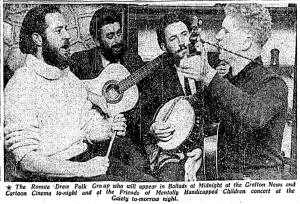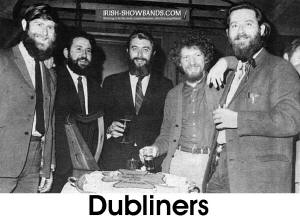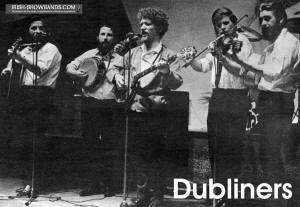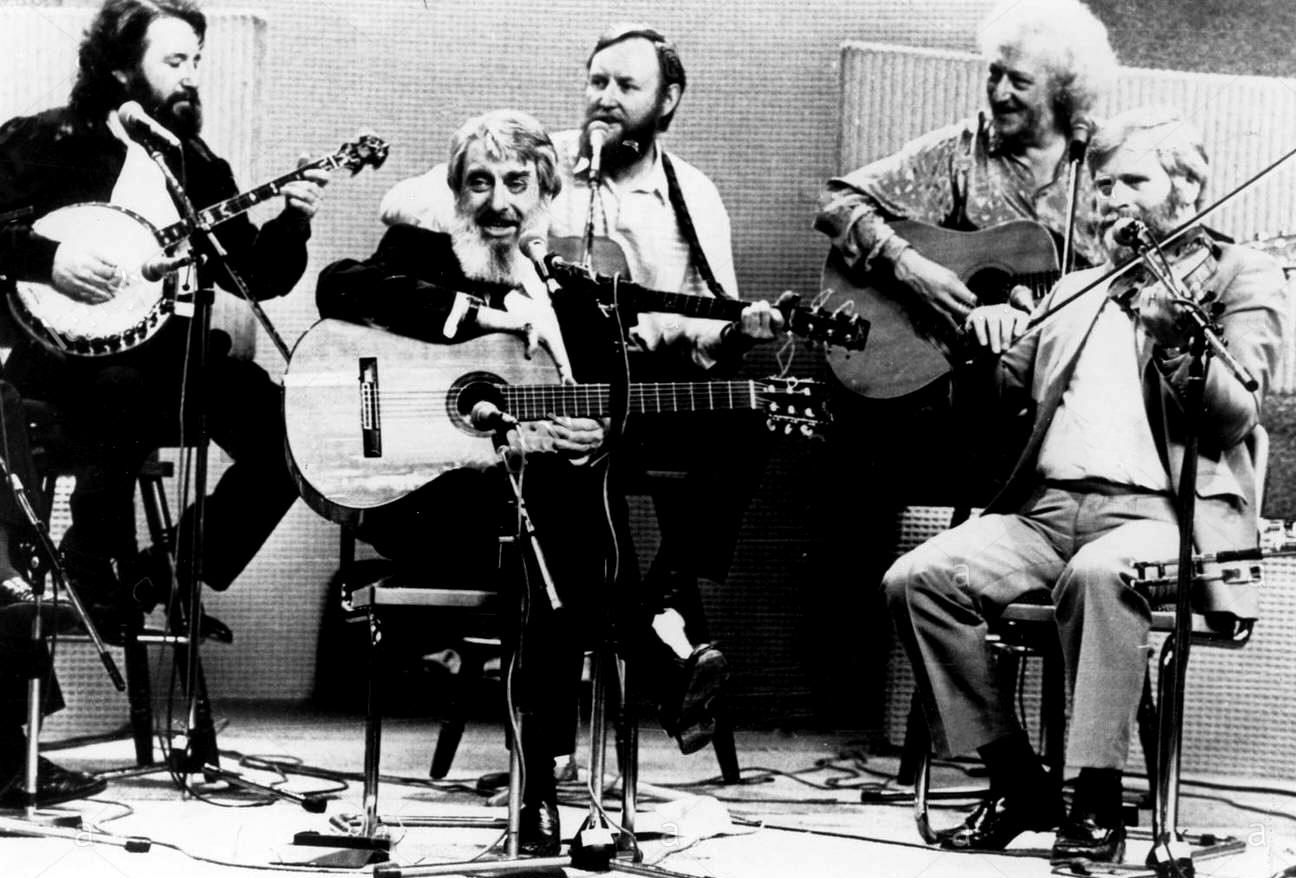The Dubliners (1963-2012)
Photo Gallery -
Band Lineups -
Discography
- Audio samples -
Where Are They Now?
The Story
 There is little than can be written about the Dubliners which has
not already been recorded by hundreds of other sources across the
globe. They are one of the true legends of the Irish entertainment
scene and from their formation in the October, 1963, they provided a
unique mix of Irish music and humour, along with the legendary
exploits of their members. Led by their rowdy front men, the late
Luke Kelly and Ronnie Drew, the Dubliners took the Irish folk scene
by storm and in the process, set the standard for Irish "folk" music
- then and now.
There is little than can be written about the Dubliners which has
not already been recorded by hundreds of other sources across the
globe. They are one of the true legends of the Irish entertainment
scene and from their formation in the October, 1963, they provided a
unique mix of Irish music and humour, along with the legendary
exploits of their members. Led by their rowdy front men, the late
Luke Kelly and Ronnie Drew, the Dubliners took the Irish folk scene
by storm and in the process, set the standard for Irish "folk" music
- then and now.
The origins of the band are a
little fuzzy as they really started as a loose session group which
got together on the fledgling Dublin ballad scene. In October, 1963,
it was announced in the Evening Herald that a new group had
been formed by Ronnie Drew, Luke Kelly, Barney McKenna and Ciaran
Bourke. The original band
was called the Ronnie Drew Group. On a recent episode
of Reeling In The Years - 1962 on RTE television, the Ronnie Drew
Group is pictured performing McAlpine's Fusiliers and it is Bob
Lynch, not Luke Kelly who is with the group. The video clip was actually from 1964, not 1962,
as the group only formed in late 1963.
Notwithstanding this
mix-up, the Dubliners started out as a
four piece with Ronnie Drew, Luke Kelly, Ciaran Bourke and Barney
McKenna. It was 1963 and Irish folk or ballad music was just
starting to make a comeback in the pubs in Dublin and around the
country. They were originally known as the Ronnie Drew Folk Group,
but Ronnie did not like the name and Luke Kelly suggested The
Dubliners, after the James Joyce book of the same name.
 Although the Clancy Brothers are often cited as the first
Irish
folk act to "break big," they did so mainly in and from
the United States. Meanwhile the Dubliners were hard at work singing
their ballads in the backroom of Paddy O'Donoghue's pub in Merrion
Row, Dublin. The sessions were bawdy and the air was heavy with cigarette
smoke and Guinness.
Although the Clancy Brothers are often cited as the first
Irish
folk act to "break big," they did so mainly in and from
the United States. Meanwhile the Dubliners were hard at work singing
their ballads in the backroom of Paddy O'Donoghue's pub in Merrion
Row, Dublin. The sessions were bawdy and the air was heavy with cigarette
smoke and Guinness.
In the mid 1960's the Dubliners
were part of a handful of groups at the forefront of the Irish folk
revival. Folk clubs sprang up all around Dublin and featured artists
like the Dubliners, Johnny McEvoy, Al O'Donnell , Jon Ledingham, the Johnstons,
Ludlows...the list went on and on. However, it was the Dubliners who
possessed a special blend of story telling, musical skills, personality and
bawdiness to make them unique on the scene. Ronnie Drew and Luke
Kelly were the driving forces behind the group's success and unique
characters in their own right.
In early 1964, Luke Kelly left the band
and embarked on a solo career. Meanwhile John Sheehan and Bob Lynch
had been playing at another ballad session on Saturday nights in the
Crofton House Hotel in Dunlaoire with Andy Rynne and Aideen Ni
Coileain. In late May, 1964 Bob and John joined with the boys and
around this time, they changed their name to the Dubliners.
In the meantime, Luke became a
solo artist and for a time, was living and working in London. His
trips back to Dublin were becoming more rare and he would often
appear on stage with people like Pete Seeger, Ewan McColl and the
Clancy Brothers. Luke would return to the band in June, 1965 and Bob would
leave, but John Sheehan stayed, making the band a five piece
for the next eight years. We will research this further.

1967 was the year the band had
their big break. Their song, Seven Drunken Nights, released
in early 1967 was banned by RTE, but played extensively by the
pirate station, Radio Caroline. The end result was chart success in
Britain where the song eventually climbed to Number 7 on the British
Charts in March and was Number 1 in Ireland. Suddenly, the Dubliners
were major International stars. Their follow up single, All for Me Grog,
was not nearly as successful, failing to chart in England and
reaching Number 10 in Ireland. However, they followed it up with
another British success, Black Velvet Band, which went to
number 15 in the UK charts in August and Number four in Ireland.
They also released an album, Drop of the Hard Stuff, which
went to number five in the UK charts in May of 1967.
Although the band would continue
to have chart success at home, these would be the only charts
successes the band had in England (until 2008 with the Pogues), but it was enough to put them on
the road to international acclaim. In 1967 the band was touring the
English Clubs and ballrooms of Ireland regularly and had started to
make
forays into the European market, but had not yet made any attempts
to try their luck in America. In a Spotlight interview in July, 1967
Luke Kelly said, "We're taking things as they come. America? I'd
love a chance to play there and just see how they'd take to us."
In March, 1974, Ciaran Bourke
suffered a brain aneurism while sitting in his dressing room, during
a concert in London with the band. He would suffer a second aneurism
while being operated on in a London hospital. The band hired the
late Jim
McCann as a temporary replacement for Ciaran with the understanding
that he would leave once Ciaran returned. In the meantime, Ronnie Drew left the band
to pursue a solo career and Jim
McCann was offered a permanent place with the band. Around this
time, Luke was taking part in the Dublin theatre show Joseph and
his Amazing Technicolor Dreamcoat and after playing a few casual
gigs with other members of the cast rumours abounded that he, too,
was leaving the band. However, manager Noel Pearson issued a
statement that Luke was not leaving and that they hoped to have
Ciaran back by November. Jim would stay with the band until
March, 1979 when he left to again pursue his own solo career and
Ronnie Drew rejoined the band. Ciaran
remained a member of the band, but would never perform with them
again and sadly passed away in 1988.
In June, 1980, the band was
playing a series of concerts in Cork when Luke had to leave the
stage due to a migraine, he would return for the second half of the
show, but would end up in hospital the following day. Although it
was expected he would return to Dublin with the group, he underwent
emergency surgery in Cork to remove a brain tumor and was off the
road for a prolonged period during which Eamonn Campbell was bought
in as his replacement.,
During the 1980's the band
continued to tour, record, and have the craic. Ronnie Drew would
return in 1979 to the band's lineup, but Luke Kelly would be
replaced by Sean Cannon in April 1983 after Luke had suffered a
second brain tumour which was also removed, and although it was hoped he would make a
full recovery, he had to leave the band for an extended period. Over
the next 12 months, reports on Luke's health were mixed with some
reports that he was recovering and he did rejoin the band in the
summer of 1983, playing his last gig in November, but in January,
1984 Luke was critically ill. On January 30th, Luke sadly passed away at
the age of only 43.
 Around this time John Sheehan took
over management of the band as Noel Pearson went to the United
States, As well as that, Sean Cannon, who had been temporarily
filling in during Luke's extended period of bad health was made a
permanent member of the group.
Around this time John Sheehan took
over management of the band as Noel Pearson went to the United
States, As well as that, Sean Cannon, who had been temporarily
filling in during Luke's extended period of bad health was made a
permanent member of the group.
In March, 1987, the Dubliners were
featured on a now famous night on Ireland's Late Late Show
celebrating their 25th anniversary (which is strange given that they
were technically founded in 1963). Irish entertainment luminaries
such as U2, Stockton's Wing, The Pogues, Christy Moore and Davey
Arthur paid tribute to the band.
Coinciding with their 25th
anniversary, the band recorded a new album called "A Celebration,"
which was produced by Eamonn Campbell, who had previously stepped
into the band temporarily in 1980. Following this, Eamonn was asked
to join the band permanently and the band was officially a five
piece again for the first time in thirteen years. On May 7th, 1987,
the band was awarded the "Freedom of the City" by the Dublin
Corporation. The following
year, the band was once again visited by tragedy when Ciaran Bourke,
who had remained a "member" of the band since being struck down in
1974 passed away on May 10th, 1988 at the age of just 53.
Since our site covers the Irish
entertainment scene from 1955 to basically 1985, we finish the
Dubliner's feature here. If you are interested in a detailed account of
the band's history since then, there are many sites on the Internet
dedicated to the Dubliner's and their 50-plus year history.
The death of Barney McKenna on
April 5th, 2012 brought to a close a special era in Irish folk.
Barney was the last surviving original member of the band and
although John Sheehan has been with the band since 1964, he was not
in the original group. Barney, Luke, Ronnie and Ciaran made history
and have now all passed into history.
Update: As the Dubliners
celebrated fifty years on the road in 2012, John Sheehan, the only
member of the band to have been with them since 1964 (joining the
original lineup), announced his retirement and this officially ended
the era of the Dubliners. However, the remaining members have
continued to tour using the name, "The Dublin Legends (formerly the
Dubliners)." This group features Sean Cannon and Eamon Campbell,
both of whom did play with members of the original band. Sean since
1983 when he replaced Luke Kelly and Eamon since 1987. They continue
to bring the Dubliners' music to new generations of fans at home and
across the world. Sadly, Eamonn Campbell passed away in
October, 2017 at age 70 after a short illness.
Click on thumbnails for full images
